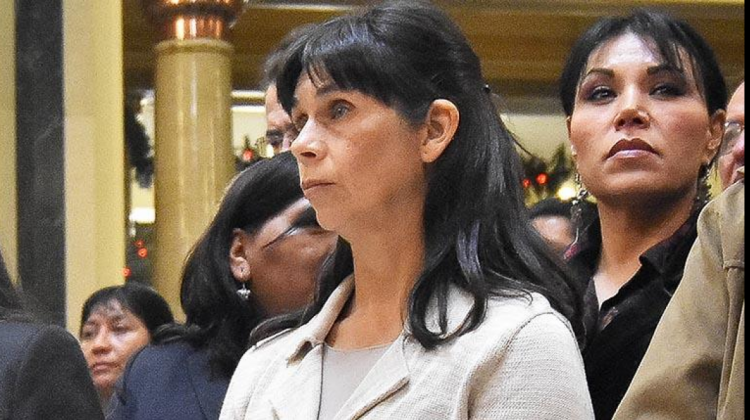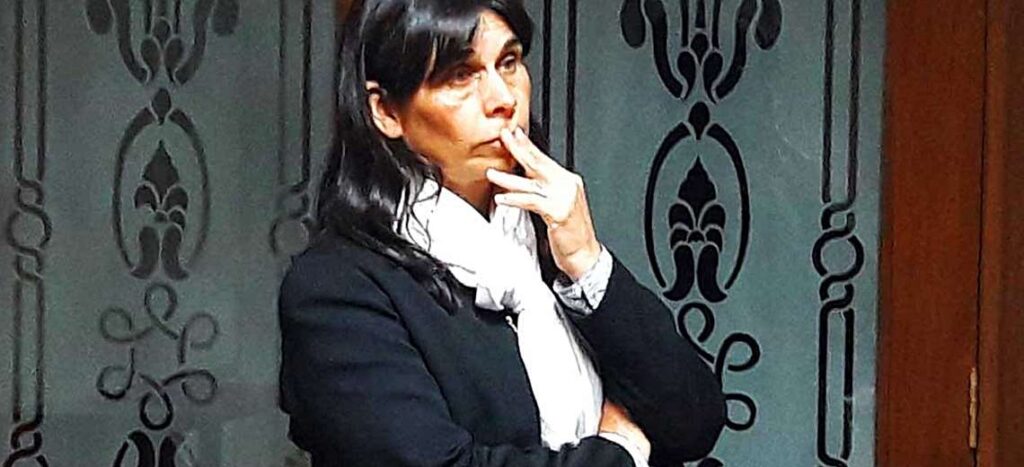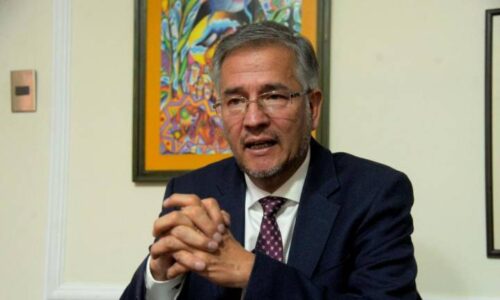

Former Supreme Electoral Tribunal Member
22 November 2021
Former Tribunal member Baptista reveals that the Supreme Electoral Tribunal (TSE) did not resolve two causes of action that could have led to the loss of the MAS legal status
The former electoral authority re-wrote a letter explaining the reasons for her resignation. Among several denunciations, she says that in the week she was on vacation, 60 officials without merits were hired
Rosario Baptista reappeared after her resignation from the Supreme Electoral Tribunal (TSE). The former Tribunal member, in an extensive letter, revealed that the electoral body did not resolve two causes of action that could have led to the loss of the legal status of the Movement Towards Socialism (MAS). The former authority also assured that if Bolivia does not change the electoral system –and also the functioning of justice– “a tyrant government” will be consolidated and “Evo Morales will go unpunished,” whom she considers as a person who wants to hold on to power.
In addition, Baptista revealed that in the week that she was on vacation, 60 officials without merits were hired and with the endorsement of Tribunal member Dina Chuquimia, appointed by President Luis Arce.
“And it is for this unique party that the Supreme Electoral Tribunal chose not to process a denunciation. A Tribunal resolves the cases submitted to it, it does not hide them, it does not choose what to judge and what not. It is its obligation to process everything, even if only to reject it, in accordance with the law. In this specific case, the existence of two causes of action that could have led to the cancellation of its legal status was denounced, one for the use of State property for the electoral campaign of Evo Morales, and the other for discrimination, explicit in the Organic Statute of the MAS-IPSP approved in 2012, which determined that access to public service corresponds only to party members,” Baptista revealed.
The former Tribunal member said that the denunciations were unsuccessful because the causes of action went from one “direction to another direction” and that there was no response from the officials of the electoral body, who according to Baptista, were threatened in order not to resolve the case.
“I was accused in the Plenary Chamber of inventing the fact that the denunciation was pending, they forgot that I was going around from one direction to another, without anyone wanting to process it. The investigation was carried out; the evidence was obtained, not legalized because the officials in charge were threatened, the Ministers in office refused to hand it over, and all this during the transitory Government. Today, this denunciation is still pending processing, many others filed for the same purpose were resolved, but with different causes of action and without valid grounds, all were resolved in due time; not this one,” Baptista said.
Then, the former Tribunal member demands that changes be made in the State Organs in order to avoid a “tyrant government” and to avoid impunity in favor of Evo Morales.
“Failure to make corrections to the system that makes up all the Organs of public power, distorted by a malicious will that has hijacked the sovereignty of the people in favor of a political party, entails the consolidation of a tyrant government, which has dismantled democracy and will persist in sustaining with impunity those who, like Evo Morales, cling to power by deceiving and betraying the very people they claim to represent, to whom they have done nothing but divide, based on lies,” says part of Baptista’s letter, who does not clarify whether she is in Bolivia or outside the country.
Baptista questioned that there is only one political party in Bolivia, referring to the Movement Towards Socialism (MAS), and rejected that there is a system of political parties in the country. The former Tribunal member considered that the MAS should lose its legal status and considered that “the circles of impunity and corruption should be broken” so that “those who have hijacked democracy” do not govern.
“Under these conditions, things cannot even be corrected from the inside; the responsible, active and committed participation of the population is required; it is time for citizens to regain their sovereignty, and exercise it directly and legitimately, respecting their diversity, free from pressure, extortion, and manipulation of the ruling power, exercising their right to resort to ‘the supreme recourse of rebellion against tyranny and oppression’ considered by the Universal Declaration of Human Rights, when their rights are not protected by a regime of Law. It is not a political issue, it is a Human Rights issue and minimum guarantees to regain the Rule of Law. Changing things requires starting from something, and that something is nothing more than breaking the circles of impunity and corruption. Those who have hijacked democracy to dismantle it cannot govern,” says another part of the letter.
Baptista added that in the week that she was vacationing, 60 officials who do not meet the criteria to join the electoral body were hired. These new public officials –she said– had the endorsement of Tribunal member Dina Chuquimia, who was appointed by President Luis Arce to replace Salvador Romero. The former Tribunal member again denounced that the electoral body has employees who “are under pressure and control from those who operate internally for the MAS.”
“The appointment of personnel must be made through public recruitment. In my absence due to vacation, they appointed more than 60 people, without even verifying if they met the requirements of the position; they refused to do it for six months, starting in April, and in one week, during my absence, they filled all the vacant positions, under the lead of the newly arrived Tribunal member,” revealed Baptista.
The former Tribunal member regretted that she now needs to look for security for fear of reprisals from the current ruling power and the justice [system] for the denunciations that she put forward. In addition, Baptista said that it doesn’t matter where she is at the moment, so she did not specify if she is in Bolivia or abroad.
Below, the letter from Rosario Baptista in full:
MY COMMITMENT TO BOLIVIA
I am Rosario Baptista Canedo, from Cochabamba, I was born in 1965, I am a lawyer and I have worked all my life in the field of human rights, especially the rights of women and indigenous peoples. I decided to run for the Supreme Electoral Tribunal in 2019, after the serious political and social conflict that occurred after the General Elections process of that year. 502 people applied, and after a process of qualification, examination, and merit contest, the Legislative Assembly appointed 6 of us as members of the Supreme Electoral Tribunal.
The position for which we were elected is that of Members, it is a judiciary position of a Supreme Court, in which political rights are protected and the democratic institutionality of the country is safeguarded, through the formation of the organs of the public power through the citizen vote, for which we must be impartial, and ensure that the entire Electoral Body is impartial; we have relations of cooperation and coordination with the other Organs: the Executive, the Legislative and the Judicial, but it is our obligation to also preserve our independence and separation from them because that is how the organization of the State in democracy is founded. But we must not only be independent from them, but also, and especially, from political organizations, which we regulate, register, and supervise.
As members of a Tribunal, we do not denounce; we receive people’s requests, denunciations, and warrants; we process, respond, investigate and sanction them, when appropriate. That is why we are a Supreme Tribunal. Receiving a denunciation and evading its processing due to the consequences it could have is unethical, undemocratic, violates human rights, generates responsibility for the State, and constitutes a crime. It is lying to the people, it is omitting the obligation to impart electoral justice; is to look away and feign insanity.
In our political system, electoral participation is mediated by political organizations: [political] parties, citizen groups, and indigenous peoples. In the last 15 years, we have seen that a single party of national scope has been consolidated, there are 10 other small, dispersed, some without even militants, which have given rise to a black market of acronyms, borrowed, rented, sold, regardless what their declaration of principles, their government program or the ideological position they have (because they no longer have any of this), which the opposition turns to for each election; other parties, the least, have national legal status, but only departmental presence. The truth is that the political party system practically does not exist. There is a single party.
And it is for this unique party that the Supreme Electoral Tribunal chose not to process a denunciation. A Tribunal resolves the cases submitted to it, it does not hide them, it does not choose what to judge and what not. It is its obligation to process everything, even if only to reject it, in accordance with the law. In this specific case, the existence of two causes of action that could have led to the cancellation of its legal status was denounced, one for the use of State property for the electoral campaign of Evo Morales, and the other for discrimination, explicit in the Organic Statute of the MAS-IPSP approved in 2012, which determined that access to public service corresponds only to party members. On a second occasion in which its legal status was at equal risk, the party itself confessed that the provision, by which in a previous election the legal status of a Beni political organization was canceled, a few days before the voting day, was unconstitutional and this was officially recognized by the Constitutional Court, which on the previous occasion found a way out to avoid saying it.
The justifications for not processing that denunciation can be many; the political conditions that existed just a few weeks before, the threat of a civil war, a political pact between the different forces in conflict, with the endorsement of some Tribunal members, ideological conditioning, financial gifts, personal threats, or simple negligence. None of them are a legal reasons; none of them are in accordance with justice. None of them are given directly to the people, and none of them justifies failing to fulfill our obligations. I was accused in the Plenary Chamber of inventing the fact that the denunciation was pending, they forgot that I was going around from one direction to another, without anyone wanting to process it. The investigation was carried out; the evidence was obtained, not legalized because the officials in charge were threatened, the Ministers in office refused to hand it over, and all this during the transitory Government. Today, this denunciation is still pending processing, many others filed for the same purpose were resolved, but with different causes of action and without valid grounds, all were resolved in due time; not this one.
The problem is not just whether or not there was a fraud (the word does not even exist in our legislation). There is no true transparency, we always had and will have that doubt. Because there were doubts, a new electoral register was requested in the streets, which was made in 2009 and the spurious means of its creation also generated doubts, never cleared, leaving the door open to uncertainty about its legitimacy. And more than 10 years later we are at the same point, with the same doubts, after another questioned election in 2014, the shameful one in 2019, and the supposedly exemplary one in 2020. Not carrying out a thorough investigation makes doubts persist, mistakes are repeated and illegitimacy is installed. The problem is structural, of an electoral system designed to measure, with unconstitutional laws, submissive officials, and all the inaccessible information (the most critical under confidentiality protection). The solution must also be structural and not political. There are general problems and other specific ones. Summarizing, I mention a few:
The Organs of the State with jurisdictional competence, that is, the Electoral and the Judicial, as well as the Constitutional Tribunal, are formed through the Legislative Organ, which is eminently political, with an absolute majority of a single political party, the citizen vote in judicial elections only legitimizes the party’s candidates, maintaining an iron submission over them.
The Constitution and the main laws are the product of agreements emerging from high-conflict situations, in which politicians made and make agreements responding to their interests, often personal, because they do not have a political party and they omit the interests of the population, for their benefit.
The political party system has been completely destroyed, leaving a few surviving parties, by decision and will of the hegemonic party, to which they are functional. The politicians join in, paying the “rent” of the initials for each election, participating in this farce with all enthusiasm. This system is maintained despite its democratic ineffectiveness, but independent participation without political organizations is prevented.
When the system cannot manipulate the results in its favor, it simply ignores them, as it did with the 2016 referendum, violating the Constitution and the laws. Not only did the Supreme Electoral Court itself do it, which enabled Evo Morales for the third time in 2014 and for the fourth time in 2019; the Constitutional Court also did it in 2014, 2016, and 2019; and the politicians also did it by participating in elections with an absolutely illegal candidate, without questioning anything. They legitimized him with their presence; now they demand my presence to legitimize the acts of this Supreme Electoral Tribunal, to which my dissident position benefited to simulate a “balanced” conformation, and we citizens have legitimized it with our vote, the vote that when it is doesn’t suit their interests they do not want to respect.
The electoral legislation is unconstitutional; this was recognized by the MAS itself when its legal status had to be canceled, as they did without blinking in 2015 against a political adversary, but it also violates due process, putting individual rights in the hands of the party delegate, thus allowing corruption and sale of candidacies and preventing internal democracy in political organizations. Law 1096 is unconstitutional; it violates political rights, giving political organizations (the single party) the political right to be elected. Filing actions of unconstitutionality only serves for the record, because the Constitutional Tribunal will not do its job impartially and will only consolidate them, with all its arbitrariness.
The system tolerates torture exercised against women in elective office, to achieve their resignation in favor of their substitutes or that their actions be subjected to the interest of the party. Violence against women, especially in municipalities and departmental assemblies, is not addressed effectively, the treatment of a regulation that sanctions political parties for these acts has been omitted, which has been seen in the cases brought to the attention of the Supreme Electoral Tribunal (TSE), respond to organic decisions, especially and mainly in the case of the MAS.
In the technological, legal, and jurisdictional field, it is avoided to open the sources, to allow the observation, supervision, and real and effective citizen control; they expect an act of faith from the people, to justify the absence of institutional transparency. There is no need to carry out an “archeological [study]” of the electoral register. They want to convince about the integrity of the electoral register through publicity, with slides and exhibitions. Technology must be open, subject to public scrutiny, all the time, permanently. There is no reason why it should not be. Confidentiality clauses only raise doubts. Everything can be fine, it is a possibility. But nothing indicates that it is. What cannot be verified, cannot be validated, and much less legitimized. There are enough reasons to doubt. But there are also mechanisms to clear up these doubts and they are not being used.
The appointment of personnel must be made through public recruitment. In my absence due to vacation, they appointed more than 60 people, without even verifying if they met the requirements of the position; they refused to do it for six months, starting in April, and in one week, during my absence, they filled all the vacant positions, under the lead of the newly arrived Tribunal member. In the electoral period, designations were made on the basis of merit, but it was agreed that after the elections, designations would be done through public recruitment, which was complied with. They are dubious designations, with their backs to the people and, above all, faithful to their Statute.
People do not have access to information, elementary things are kept in reserve; there are no means for the population to verify the conditions of an election or challenge it. The algorithms should be public, open; the algorithms of the [electoral] calculation, of the jury random selection, should be visible so that citizens who understand the issues can verify that they are okay; the sessions, recordings, and minutes of each plenary session must be public, they are essential elements to generate public confidence, as well as the processes of hiring electoral notaries and many etceteras.
The participation of indigenous peoples has been limited, it is unacceptable that the first time they participated directly without party mediation for the election of special indigenous seats was as recently as 2020, eleven years after the approval of the Constitution, and 3 elections later; but even so, they were forced to compete against the party. The possibility of participating as political organizations was recognized, but their participation in single-member constituencies, for example, is prevented. The MAS has divided the indigenous, native, and peasant organizations, preventing the defense of their rights and subjecting once again the interests of their peoples to the party. And there are the issues of the prior, free and informed consultation that the Electoral Body supervises, nominally and seeing mining, logging, and hydrocarbon concessions pass, without complying with this constitutional requirement, in addition to invading their territories, again and again, to hand them over to corrupt interests.
The form of allocation of multi-member seats in the departmental assemblies has been designed so that regardless of who assumes the governorship, the assembly is always in control of the MAS, by far. The presidential system (which is not the best anyway), planned at the national level, has been broken, whereby the vote obtained by the Executive determines the percentage of multi-member deputy delegations. At the departmental level, the Governor goes alone, which would not be bad at the national, departmental, and municipal levels, so that all representatives, in all legislative assemblies, be elected individually and democratically. But as currently designed, the percentage allocation by political organizations clearly creates benefits for a single party.
But this is not all.
I understood that my presence not only legitimized impunity; my presence was generating a mirage that prevented us from seeing how the Electoral Organ is kidnapped; although initially professional, committed to democracy, efficient and reliable personnel were appointed, today they are under pressure and control from those who now operate internally for the MAS.
We must not forget the already open, shameless, and shameful defenestration carried out by President Luis Arce of six Tribunal members of the Departmental Electoral Tribunals of Pando, Beni, Santa Cruz, Potosí, Oruro, and Tarija, three of them who held the presidency, nor the complicity of the Constitutional Court for a similar act, to remove with the stroke of a pen four Tribunal members of the Beni Departmental Electoral Tribunal, legitimately elected and appointed as determined by the Constitution, now in legal limbo due to a constitutional protection action granted to a person who was disqualified in the selection process, and for which the appointment process of four Tribunal members who were in office has been annulled, leaving from July 21 an entire Departmental Tribunal without authorities (except for the Tribunal member imposed by President Arce).
And to date, four months later, that Tribunal is in the hands of a single Tribunal member, who is the “trusted” member of the President and is administered by the Supreme Electoral Tribunal (TSE). But, above all, it should not be forgotten that the Electoral Body maintained public silence in both cases and that internally they received and welcomed the presidential Tribunal members. And now, only a few Tribunal members are waging a solitary struggle defending themselves not only from the indifference and passivity of the Supreme Electoral Tribunal itself, but from the many criminal proceedings initiated against them and the “procedural burden” that prevents the Constitutional Court from addressing in a timely manner the constitutional actions filed.
I showed my dissent, they were published; I exposed them, despite the gag of the sole member’s position. I have not seen those who now regret the “take over” of the Electoral Body, regarding the Organic Statute of the MAS, with which they not only appropriate the Electoral Body but the entire State, unabashedly. It states that THERE ARE NO NEUTRAL OR INDEPENDENT AUTHORITIES IN ANY STATE INSTITUTION. And I have not seen those who now regret a biased Electoral Body get outraged. Those who exercise functions in positions that require independence and impartiality have two paths: either join the party, make monthly contributions and accept the mandatory consultation with their National Directorate to make decisions, or leave. Unless, as the Tribunal members say, the militants do not agree and file the “corresponding actions to determine their unconstitutionality,” which should have been determined by the Supreme Electoral Tribunal. They made their decision, and they stay. We know under what conditions, the Statute they registered sets said conditions.
When the political and social crisis of 2019 occurred, which was nothing other than the overflow of an already inadmissible situation generated by the MAS-IPSP, to impose itself violently and remain in power indefinitely as a mechanism to guarantee its impunity; those called to respond to this situation to give the population a truly democratic, honest and justice-framed option, with a vocation for service and loyalty to the citizenry, acted away from that clamor, they did so from pride, taking advantage of the situation to postulate their candidacies in a voracious struggle, leaving people –once again– without options that truly respond to their needs, adding another factor of advantage to the many already existing in the system, to perpetuate in power those who have criminally dismantled democracy.
It is important not to lose the horizon of the structural. If only one issue is resolved, it is not enough to correct the system. The agenda indicates that later will come the legislative reform of the laws on electoral matters; the population and housing census, which will lead to the redistribution of single-member districts; the judicial elections, and then again the cycle of general, departmental, regional and municipal elections, successively, all this without making open corrections, with citizen participation and observation.
A binding means of verification, carried out by citizen input, open to those who freely assume the responsibility of verifying with the endorsement of the scientific research method, the processes and the application of human rights in the Constitutional, Justice and Electoral Tribunals, in order to verify the impartiality, independence, and adherence to the Constitution and the laws that apply in the cases submitted to its jurisdiction and competence, is the way to restore justice, establish guarantees and with it, democracy, restoring the rule of law, restoring sovereignty to whoever belongs in an inalienable way: the people. And the people are all of us, not just the militants of one party.
In the meantime, there will be no other solid political organizations, nor will citizens be adequately informed, nor will respect for the vote be guaranteed. Failure to make corrections to the system that makes up all the Organs of public power, distorted by a malicious will that has hijacked the sovereignty of the people in favor of a political party, entails the consolidation of a tyrant government, which has dismantled democracy and will persist in holding with impunity those who, like Evo Morales, cling to power, deceiving and betraying the very people they claim to represent, whom they have done nothing but divide, based on lies.
Under these conditions, things cannot even be corrected from the inside; the responsible, active, and committed participation of the population is required; it is time for citizens to regain their sovereignty, and exercise it directly and legitimately, respecting their diversity, free from pressure, extortion, and manipulation of the ruling power, exercising their right to resort to “the supreme recourse of rebellion against tyranny and oppression” considered by the Universal Declaration of Human Rights when their rights are not protected by a regime of Law. It is not a political issue, it is a Human Rights issue and minimum guarantees to regain the Rule of Law. Changing things requires starting from something, and that something is nothing more than breaking the circles of impunity and corruption. Those who have hijacked democracy to dismantle it cannot govern.
I want to express my appreciation for all the expressions of solidarity, appreciation, and support, thanks to which I feel good, with the spirit to continue, always. I regret having to seek protection, not only from those who exercise power, but also from our justice system, which is the one I should trust and the one that should protect me, but, on the contrary, it has become a servile tool of persecution and extortion. It doesn’t matter where I am. I am with my country, seeking that human rights and justice be restored.
Rosario Baptista Canedo
Source: https://eldeber.com.bo/pais/exvocal-baptista-advierte-que-si-no-hay-cambios-en-el-sistema-electoral-se-consolidara-un-gobierno-t_256067?utm_medium=Social&utm_source=Twitter#.YZzF10XOs70.twitter




